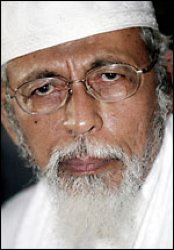 [JakartaPost] The National Police's counterterrorism unit, Densus 88, conducted a series of successful overnight operations against bully boyz with links to the Abu Omar and Autad Rawa groups, the police say.
[JakartaPost] The National Police's counterterrorism unit, Densus 88, conducted a series of successful overnight operations against bully boyz with links to the Abu Omar and Autad Rawa groups, the police say. The 20 terror suspects -- seven killed and 13 incarcerated
I ain't sayin' nuttin' widdout me mout'piece!
-- in the raids across Java are linked to the groups that collect money to support the activities of mujahidin (those engaged in jihad) in Poso, Central Sulawesi.
Early investigations indicated that the men had been involved in armed robberies at Bank Rakyat Indonesia (BRI) offices in three cities.
"They stole Rp 790 million [US$81,192] from BRI in Batang and Rp 630 million from BRI Grobogan [both in Central Java]; and Rp 460 million from BRI Lampung. They also attempted to burn down Glodok Market in West Jakarta," said National Police front man Brig. Gen. Boy Rafli Amar on Thursday as quoted by Antara news agency.
The suspects carried out various initiatives to collect money, including robbery.
"Four alleged bully boyz were planning a robbery in Kebumen [Central Java], when they were arrested in an overnight raid in the regency," said Boy.
It is alleged that one suspect, Abu Roban alias Untung, had been involved in some robbery cases -- a jewelry store in Tambora, West Jakarta; as well as the three BRI offices -- before Densus 88 officers killed him in Batang.
Police linked the suspects with Santoso, who is believed to be behind a series of attacks in Poso over the past few years.
Santoso himself is a former member of a terror group led by Basri, a member of the Jamaah Islamiyah (JI) group. Basri surrendered to police after a shootout on Feb. 1, 2007, in Poso where a Mohammedan-Christian conflict killed at least 1,000 people over the course of 1998 to 2002.
On Wednesday and Thursday, Densus 88 personnel raided areas in Batang, Kebumen and Kendal in Central Java; Bandung in West Java; and Banten. During the raids, the officers rubbed out seven suspects and 3 others were captured alive.
"The terror suspects killed during the raids were identified as Abu Roban, Bastari, Toni, Bayu alias Ucup, Budi alias Angga, Junet alias Encek and Sarame," Boy announced.
The suspects captured alive in Jakarta were Agus Widharto, Agung, Endang, Faisal alias Boim and Iman.
Iwan and Puryanto were arrested in Kendal. While four others -- Budi, Farel, Slamet and Wagiono -- were apprehended in Kebumen.
The two suspects arrested in Bandung were Haris Fauzi alias Jablud and William Maksum, alias Acum alias Dadan.
The bodies of the three dead men were flown to Dr. Sukamto Police Hospital in Kramat Jati, East Jakarta, on Thursday after being examined at Bhayangkara Hospital in Semarang.
| "They're dead, Jim." "Dr. Quincy, however do you do it?!" |
| But not a shutter gun in the bunch, nor a crossfire, nor Mahmoud the Weasel calling in the tip. The Rab are still Grand Champions at this kind of thing. |
| ...that last being particularly exciting... |
Some residents in Kembaran said that the entourage of alleged bully boyz had only stayed for around 10 days in the hamlet and they had introduced themselves as jamu (herbal medicine) sellers.
| Oddly enough, said one resident, the only herbs they had in stock were opium, ganja, and qat, all of which they steadfastly refused to part with. |
"The owners must have copies of their occupants to avoid unexpected occurrences," West Java Police front man Sr. Comr. Martinus Sitompul said.
"We also asked the public to increase their awareness by organizing night patrols."
Some of the villagers in Kembaran, Kebumen regency, had returned to their houses by Thursday afternoon.
One of them, Hastuti, said her family had taken refuge at a relative's house on Wednesday night.
Others began repairing the damage inflicted on their houses following the shoot out between Densus 88 personnel and the alleged terrorists.
| Ah ha! They did have a crossfire, after all! Things are looking up. |
September 2012: police arrest a man named Hasan alias Wendi with suspected links to a Surakarta-based terrorist group at Pantoloan Port in Palu, Central Sulawesi. Hasan had reportedly participated at a military training conducted by Santoso in Poso where he was reportedly taught how to assemble explosives.
May 25, 2011: the shooting of three coppers in front of a Bank Central Asia (BCA) branch in Palu. Two dead, one injured.
Oct. 8, 2012: the murder of two coppers, Andi Sappa and Sudirman, in Tamanjeka hamlet, Poso Pesisir.
Oct. 9, 2012: a kaboom at a community hall in Kawua subdistrict, Poso.
Nov. 15, 2012: the shooting of Poso Pesisir Utara Police chief First Insp. Bastian Taruklabi.
Dec. 20, 2012: the shooting of six police Mobile Brigade (Brimob) members in North Poso Pesisir. Three dead and three others injured.

 Abu Bakar Bashir
Abu Bakar Bashir
 Jakarta, 22 Dec. (AKI) - Militant Muslim cleric Abu Bakar Bashir on Friday said the Indonesian Supreme Court ruling clearing him of any part in the 2002 Bali bombings was set-back for the West
Jakarta, 22 Dec. (AKI) - Militant Muslim cleric Abu Bakar Bashir on Friday said the Indonesian Supreme Court ruling clearing him of any part in the 2002 Bali bombings was set-back for the West